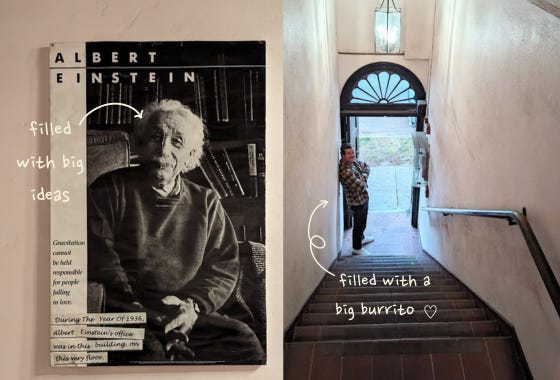After a peaceful dinner last Friday night, our toddler wanted to go for a walk. He sat through the entire restaurant meal without a fuss, so this seemed like a fair request. The thing about walking with a toddler, however, is that there is very little walking involved. It’s mostly…meandering. You stop to point at a car. You wave to a stranger in the nail salon. You—oh, look! A stick!
Halfway around the block, we came upon an open door. Inside, a set of stairs led to a floor of office suites, and the toddler insisted we go check it out. At the top of the stairs, a framed print caught our attention. It read: "During the year of 1936, Albert Einsten’s office was in this building, on this very floor.” Wow! The mind that unraveled the mysteries of our vast universe once dwelled mere steps away from my beloved chimichanga spot. All in all, it was a solid case for meandering.
Boketto (Japanese)
“What are you thinking about?”
My husband loves to ask this question. He usually asks when we’re driving somewhere and I’m staring out of the window quietly. Sometimes it takes me a while to recall what I’m thinking about. And sometimes I truly don’t have an answer. In those moments, even I’m baffled at the emptiness of my mind. “I have no idea,” I’ll say.
Boketto is a Japanese word that describes the act of staring vacantly and absentmindedly into the distance. It’s not exactly daydreaming because you’re not thinking about anything specific. It seems somewhat related to meditation, but it also seems less intentional than that. One way to think about boketto is it’s the act of doing nothing — perhaps a tough concept to wrap our Western minds around. Two educators from the University of Minnesota describe the perks of boketto:
“You might think, oh, that means I'm bored or I'm wasting time. But the research shows that the frontal lobes of our brain, the ones that deal with reasoning and planning to decision-making and judgment, they're much more creative for us when our brains are still. So we're not talking about mindfulness here…We're saying we just want you to be blank, stare out and be blank and brain. Yeah, give your brain that chance to rewire and be creative.”
When we talk about doing nothing, we always seem to justify it with reasons like "It boosts productivity!" or "It sparks creativity!" Those are good points, but it also says something about our culture's obsession with always being productive. The idea of just chilling out seems totally foreign in a world where even taking a break has to have a purpose. The artist and writer Jenny Odell suggests there might be something risky about the “simple act of doing nothing.” She writes that, “by taking a sideways step towards each other, we might realize that everything we're chasing is right here already."
From the archives
Why It Feels So Good to Chop off Your Hair: “Hair is subtly tied to our choices and thus, our identity, which is why changing it can feel so damn good.” (Note: there’s another Japanese word related to this. The word age-otori means "to look worse after a haircut")
Share-worthy
For BBC Radio 4, I talked to comedy writer Gareth Gwynn about an essay I wrote on the joy of unfinished projects. I’ve come to view my own unfinished projects as a reminder that I’m doing stuff that makes me happy. You can listen to the episode this Saturday at noon PT.
Oh hi, Baby Björk.
This gorgeous Vox piece about why people turn to conspiracy theories in difficult times. “I know what it’s like to want to do something tangible in the face of lack of control.”
— Kristin





I love the meaning of the word Boketto! It's what I do every night before I go to bed, in the bathtub. Something about just lying there soaking feels so good.